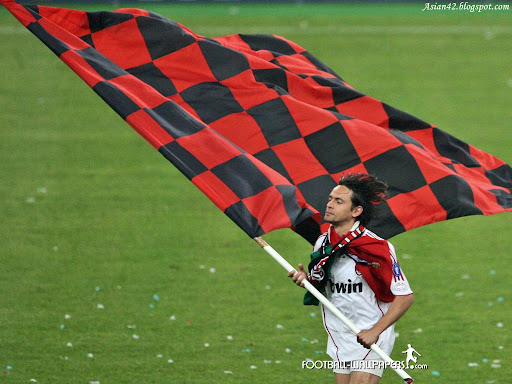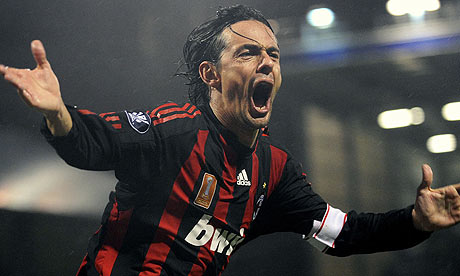Blog: Hungry Pippo simply super
Pippo Inzaghi is often derided as the player ‘who was born offside’, but James Horncastle believes his achievements deserve respect
Admittedly, it’s trite to say so. But there was something undeniably poetic about Pippo Inzaghi’s second goal against Real Madrid on Wednesday night. How else could he have become the all-time top scorer in European club competitions than from such a blatantly offside position?
After all, he was born there, according to Sir Alex Ferguson, whose quote, perhaps his most famous after “football, bloody hell”, has tellingly stuck like no other and done more to influence or warp our collective memory of Inzaghi than anything else these past two decades, which – if you ask me – is something of a disservice.
Inzaghi has always had his critics. No less than Johan Cruyff, the self-proclaimed high priest of technique, singled him out as a dilettante, saying: “Look, he actually can’t play football at all.”
Even some Italians don’t exactly know what to make of him. “Inzaghi is an extraordinary contradiction,” Mario Sconcerti wrote in this morning’s Il Corriere della Sera. “He doesn’t know how to play football. He is incapable of keeping the ball, incapable of dribbling, of a moment of magic. He only knows how to score.”
Of course, in a game where universality is valued above all other attributes, Inzaghi’s one-dimensional playing style makes him an anachronistic figure, a throwback to a now bygone age when defenders simply had the job of defending and strikers that of scoring. But that certainly shouldn’t detract from his achievements, nor his qualities, for much like a shark can detect one drop of blood in a million drops of water, Inzaghi’s sense of goal is so acute as to be nothing short of lethal.
Within 10 minutes of his debut for Leffe against Siena in 1992, a precocious young Pippo had found the net for the first time. Seventeen years later, he came full circle, scoring his 300th career goal against the same opponent, etching his name into Italian football history.
But what separates Inzaghi from the other poachers is his reputation as a man for the big occasion, which was rendered indelible in 2007 when despite being “half dead” according to Carlo Ancelotti in his autobiography, he still managed to score five goals in the Finals of the Champions League, Club World Cup and European Super Cup.
It was with that in mind that Real Madrid boss Jose Mourinho chose to ignore Milan’s other high profile attacking players like Zlatan Ibrahimovic, Robinho, Alexandre Pato and Ronaldinho in the build up to this month’s eagerly anticipated pair of Champions League matches between the two sides, even though Inzaghi had played just 170 minutes this season until Wednesday night’s encounter.
“I’d just prefer it if Pippo didn’t play,” he smiled knowingly, and of course in doing so, the Special One only served to add to his mystique, making himself look even more prophetic in the eyes of the Italian media who miss him so very dearly.
Yet Mourinho wasn’t clairvoyant in his prediction, merely appreciative of history. We shouldn’t forget that Inzaghi has averaged just over 17 goals a season throughout his entire career, a staggering feat of consistency in the modern game.
The 1996-97 campaign will always stand out in my memory, a sort of footballing precursor to the fabled baseball home run chase between Mark McGwire and Sammy Sosa a year later, when Inzaghi was locked in a thrilling season-long battle with Vincenzo Montella to become Capocannoniere, which went down to the final day.
“We closed the season in Reggio-Emilia. I was on 22 and Vincenzo on 21,” Inzaghi recalled. “The captain was [Daniele] Fortunato. But during the week Emiliano Mondonico and the team asked that I wear the armband because the title of top scorer was a victory for the team. It was a gesture that struck me also because it was Fortunato’s last game with Atalanta. That day I scored twice.”
Remarkably, Inzaghi became the first ever Capocannoniere in the club’s history, a triumph that ranks among the winners’ medals he’d later collect in such abundance at Juventus and Milan.
So for all of Inzaghi’s frankly annoying histrionics, tantrums and play-acting that only serve to infuriate and divide opinion when it comes to judging his career, it would be hard to argue that he doesn’t deserve a place in the pantheon of great scorers.
His goal tally may mislead one into believing he is selfish. But this is a man whose dedication to his craft is admirable. “I would throw away all that I have to be 15 years younger and play again without having the certainty of earning what I do now,” Inzaghi told Il Corriere della Sera earlier this year.
“The truth is that Inzaghi is still a boy… a boy in his head,” Franco Baresi laughed after last night’s match. That attitude perhaps goes some way to explaining why hungry hungry Pippo shows no sign of losing his appetite.
http://www.football-italia.net/blogs/jh122.html

 ). All fans are hypocrite, as it should be.
). All fans are hypocrite, as it should be. 



 )
)
 Defender of the injusticed - CR, Biscuit, "Insert Inter player name", Xavi etc
Defender of the injusticed - CR, Biscuit, "Insert Inter player name", Xavi etc 










